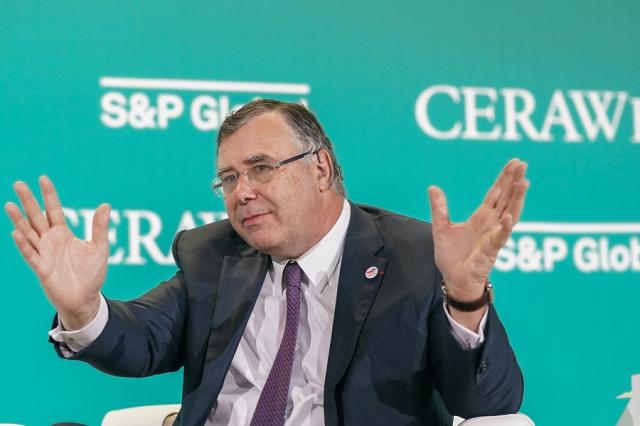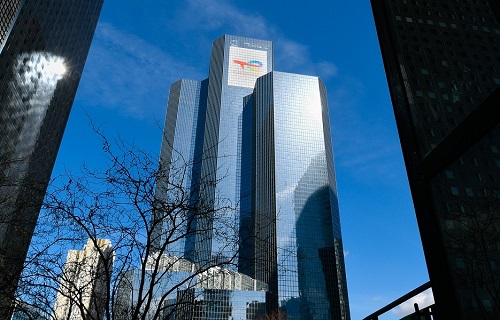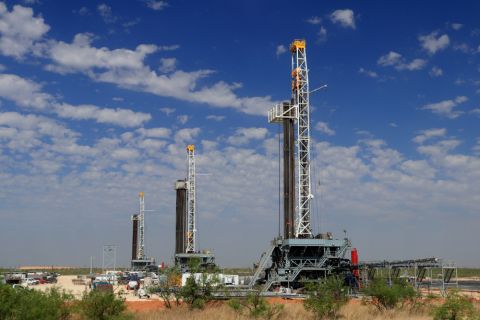
TotalEnergies’ CEO Patrick Pouyanné said during CERAWeek by S&P Global that the French energy giant would invest capital where it was more efficient, including the U.S., while encouraging European leaders to improve incentives. (Source: CERAWeek by S&P Global)
TotalEnergies CEO Patrick Pouyanné said his company would invest capital where it is more efficient and continues to encourage European leaders to seek incentives like those in the U.S. where the company plans to keep spending.
Speaking at CERAWeek by S&P Global, Pouyanné also continued to stand behind his contention that European leaders should not “complain [but] do the same,” he said on March 8 during a panel discussion at the annual event in Houston.
“We say to European governments, if you want us to invest in Europe you have to put the same incentive scheme [as] in the U.S. or even more because we have a question of competition,” he said while talking about the differences across the Atlantic.
“On one side you have one continent, the U.S. with energy, natural resources, considered low cost and the other side, the Europeans, we are dependent, or importers of energy like Japan and off course it’s at a higher cost because in fact the European economy was subsidized with Russian gas,” Pouyanné said. “And U.S. LNG when and if it comes is more expensive because LNG and pipe-gas are different costs.”

Western sanctions on Russia coupled with Moscow’s decision to curb global energy flows have engulfed most of Europe and the U.K. in a severe energy crisis and stoked inflation. Europe as a whole has turned increasingly to U.S. LNG and other LNG it could divert from Asia to fill the supply gap.
Pouyanné said that increased trade last year between the two sides of the Atlantic served to “re-link the U.S. and Europe from a geopolitical point of view.”
But Pouyanné disagreed with the recent caps put on Russian exports as the West seeks to further punish the Kremlin for its year-old invasion of Ukraine.
“To put a cap [on prices] creates an official market, a gray market, a black market, and that’s dangerous… it is easy to put some caps but it’s more complex to remove,” Pouyanné said.
The IRA and green infrastructure
Pouyanné, CEO of the French energy giant since 2014, said he welcomed the U.S. Inflation Reduction Act (IRA) and lauded it as a push to accelerate green infrastructure, which he said is necessary if the world is serious about the energy transition.
Pouyanné said the bulk of the world’s energy supply remains dominated by fossil fuels. Demand growth has risen with population growth and many of the new energies have been created to fill the gap for demand, he said.
Pouyanné said it was important to accelerate the transition but saw shortcomings in the approach the world has taken.
“First, we need to accelerate the transition but it will not happen overnight,” Pouyanné said. “We need to organize it and to [not] do it in a disorganized way. The result is that today we have a lack of supply, higher prices, [and] society does not accept and all that is a mess.”
He also questioned policies that have aided Europe in the past but are now taboo for developing economies.
Through 2022, the European governments provided fossil fuel subsidies of €400 billion to €$500 billion, he said.
At the same time, those governments were telling emerging countries that they should not subsidize fossil fuels. “There is something wrong there,” Pouyanné said.
Recommended Reading
TPH: Lower 48 to Shed Rigs Through 3Q Before Gas Plays Rebound
2024-03-13 - TPH&Co. analysis shows the Permian Basin will lose rigs near term, but as activity in gassy plays ticks up later this year, the Permian may be headed towards muted activity into 2025.
US Drillers Add Most Oil, Gas Rigs in a Week Since September
2024-03-15 - The oil and gas rig count, an early indicator of future output, rose by seven to 629 in the week to March 15.
US Drillers Add Most Oil Rigs in a Week Since November
2024-02-23 - The oil and gas rig count rose by five to 626 in the week to Feb. 23
US Drillers Cut Oil, Gas Rigs for First Time in Three Weeks
2024-02-02 - Baker Hughes said U.S. oil rigs held steady at 499 this week, while gas rigs fell by two to 117.
US Drillers Add Oil, Gas Rigs for Third Time in Four Weeks
2024-02-09 - Despite this week's rig increase, Baker Hughes said the total count was still down 138 rigs, or 18%, below this time last year.


